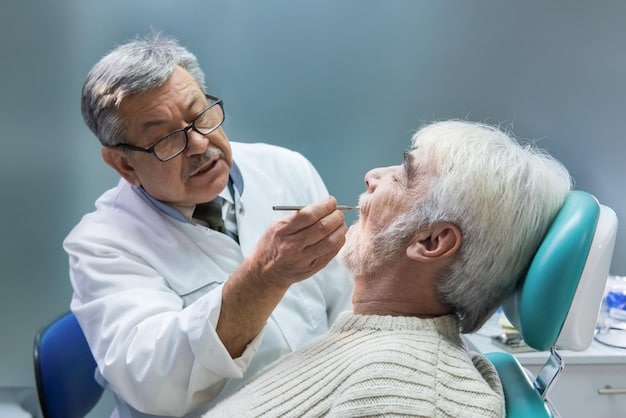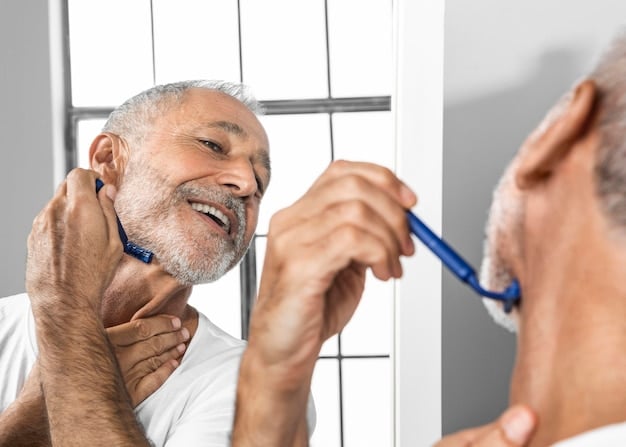Dental Checkups for Seniors: Oral Health After 65 Benefits

Regular dental checkups after 65 are paramount for seniors to maintain optimal oral health, prevent age-related dental diseases, and ensure a higher quality of life, extending beyond just aesthetics to impact systemic well-being.
As individuals reach their golden years, the focus on health often shifts to chronic conditions, mobility, and overall well-being. However, one critical aspect that frequently gets overlooked is The Importance of Regular Dental Checkups for Seniors: Maintaining Oral Health After 65. It’s a common misconception that dental care becomes less vital as we age, especially if natural teeth have been lost or dentures are worn. In reality, the aging process introduces a unique set of challenges and risks to oral health, making consistent professional dental attention not just beneficial, but absolutely essential for a vibrant, healthy life after 65.
the Unique Oral Health Challenges Seniors Face
Aging is a natural process that brings about significant changes in every part of the human body, and the mouth is no exception. For seniors, these changes can manifest in various oral health challenges that often go unnoticed or are dismissed as “just a part of getting old.” Understanding these specific issues is the first step toward recognizing the critical role of regular dental checkups.
One of the most pervasive problems is dry mouth, or xerostomia. This isn’t just an inconvenience; it’s a condition that significantly impacts oral health. Saliva plays a crucial role in washing away food particles, neutralizing acids produced by bacteria, and helping to remineralize tooth enamel. Many medications commonly prescribed to seniors—for conditions like high blood pressure, depression, anxiety, and allergies—list dry mouth as a side effect. Without adequate saliva, the risk of tooth decay, gum disease, and oral infections dramatically increases, leading to discomfort and potentially more serious health issues.
Increased Risk of Dental Caries and Root Decay
While often associated with childhood, dental caries, or cavities, remain a significant concern for seniors. Root decay, in particular, becomes more prevalent. As gums recede, which is common with age and gum disease, the tooth roots become exposed. Unlike the enamel-covered crowns of teeth, roots are covered with a softer material called cementum, making them more vulnerable to decay. This susceptibility is further compounded by dry mouth and the challenges some seniors face with maintaining thorough oral hygiene due to arthritis or other physical limitations.
- Exposed Roots: Receding gums expose the softer root surfaces, making them highly prone to decay.
- Dietary Changes: Some seniors opt for softer, often more carbohydrate-rich foods that can contribute to acid production and decay.
- Inadequate Brushing: Physical limitations can hinder effective brushing and flossing, leaving plaque buildup.
Gum Disease Progression and its Systemic Links
Gum disease, ranging from gingivitis to advanced periodontitis, can worsen with age. Chronic inflammation of the gums not only leads to tooth loss but has also been linked to systemic health problems. Research continually uncovers connections between severe gum disease and conditions such as heart disease, stroke, diabetes, and even certain types of dementia. This bidirectional relationship means that poor oral health can exacerbate existing chronic conditions, and vice versa. Regular dental checkups allow for early detection and management of gum disease, mitigating its broader health impacts.
Furthermore, seniors often experience changes in bone density, which can affect the jawbone supporting the teeth. Conditions like osteoporosis, while primarily affecting other bones, can also impact the jaw, potentially leading to tooth instability or loss. Dentures and other prosthetic devices also require regular monitoring. Ill-fitting dentures can cause sores, infections, and difficulty eating and speaking, severely impacting a senior’s quality of life. Professional dental care ensures these appliances fit correctly and are not causing any underlying issues.
the Role of Regular Dental Checkups in Prevention
Preventative care is the cornerstone of good health at any age, but for seniors, it takes on an even greater significance in oral hygiene. Regular dental checkups are not merely about fixing problems; they are predominantly about preventing them from occurring or escalating. This proactive approach can save seniors from discomfort, costly treatments, and more severe health complications down the line.
During a routine checkup, the dentist and hygienist perform a thorough examination that goes beyond just looking at the teeth. They meticulously check the gums, tongue, cheeks, and other soft tissues of the mouth. This comprehensive assessment is crucial for identifying early signs of various oral conditions that might otherwise go unnoticed by the individual. Early detection is paramount for effective treatment and better outcomes, especially when it comes to more serious issues.
Comprehensive Oral Cancer Screenings
One of the most critical aspects of preventative dental care for seniors is oral cancer screening. The risk of oral cancer increases significantly with age. During a checkup, dentists are trained to look for suspicious lesions, lumps, or discolorations in the mouth and throat. These screenings are quick, painless, and potentially life-saving. Early detection dramatically improves the prognosis for oral cancer, making regular dental visits an essential part of a senior’s preventative health regimen.
- Visual Inspection: Dentists carefully examine the lips, tongue, gums, and throat for any abnormalities.
- Palpation: They feel for lumps or tender areas in the neck and jaw.
- Patient Education: Guidance on risk factors like tobacco and alcohol use.
Professional Cleanings to Combat Plaque and Tartar
Despite diligent daily brushing and flossing, plaque and tartar can accumulate, especially in hard-to-reach areas. Professional dental cleanings are designed to remove these stubborn deposits, which are the primary culprits behind tooth decay and gum disease. For seniors, who may have diminished dexterity or limited mobility, these cleanings are even more vital. Dental hygienists use specialized tools to thoroughly clean teeth, reaching areas that a toothbrush simply cannot. This not only keeps the mouth feeling fresh but also prevents the progression of harmful bacteria.
Beyond cleaning, dental professionals provide personalized advice on oral hygiene techniques and products best suited for seniors. They can recommend specific toothbrushes, floss types, mouthwashes, and other aids that can make daily care more effective and manageable. This tailored guidance helps seniors overcome challenges and maintain their oral health between visits, ensuring that their efforts at home are as impactful as possible.
Addressing Common Senior Dental Concerns
Seniors often face specific dental concerns that require specialized attention from their dentists. Recognizing and addressing these issues head-on is key to maintaining not only oral health but also overall quality of life. Regular checkups provide the ideal platform for these concerns to be identified and managed effectively, preventing them from escalating into more serious problems.
One prevalent concern is the fit and condition of dentures and other prosthetic devices. Over time, the gums and jawbone can change shape, causing dentures to become ill-fitting. Loose dentures can lead to painful sores, difficulty chewing, and even speech impediments. A dentist can adjust, reline, or replace dentures to ensure a comfortable and functional fit. This is crucial for maintaining proper nutrition and confidence in social interactions, both of which are vital for a senior’s well-being.

Managing Dry Mouth and its Consequences
As mentioned earlier, dry mouth is a common issue among seniors, often due to medications or medical conditions. Beyond discomfort, it significantly increases the risk of tooth decay and gum disease. Dentists can offer various strategies to manage dry mouth, including recommending artificial saliva products, specific fluoride rinses, and advising on hydration. They can also work with the patient’s physician to explore alternative medications or adjust dosages if dry mouth is a severe side effect, highlighting the importance of integrated healthcare.
Dealing with Tooth Sensitivity and Wear
Tooth sensitivity, which can be triggered by hot, cold, sweet, or acidic foods, becomes more common with age due to receding gums exposing root surfaces or wear and tear on enamel. Dentists can diagnose the cause of sensitivity and recommend treatments such as desensitizing toothpastes, fluoride varnishes, or bonding agents to cover exposed roots. They can also address issues like tooth wear, which can be caused by years of chewing, grinding, or erosion from acidic foods and drinks. Addressing these issues not only alleviates discomfort but also prevents further damage to the remaining natural teeth.
- Enamel Erosion: Years of exposure to acidic foods or grinding can thin tooth enamel.
- Gum Recession: Exposed root surfaces are more porous and prone to sensitivity.
- Treatment Options: Desensitizing agents, fluoride, or restorative procedures to protect teeth.
Furthermore, many seniors may have existing dental work, such as fillings, crowns, or bridges, which need regular assessment. Fillings can crack, crowns can become loose, and bridges may harbor bacteria if not cleaned properly. Regular checkups ensure that all existing restorations are in good condition and functioning effectively. Identifying and repairing minor issues early on can prevent them from turning into major, more expensive dental problems, contributing to long-term oral health and financial savings.
The Link Between Oral Health and Overall Well-being
The connection between oral health and overall systemic health is far more profound than many realize, especially for seniors. It’s not just about a bright smile or the ability to chew food; it’s about how the health of the mouth impacts the entire body. For individuals over 65, understanding this intricate relationship underscores the necessity of consistent dental care as a vital component of holistic health management.
The mouth serves as a gateway to the rest of the body. What happens in the mouth can directly influence conditions in other organs and systems. For example, the bacteria from untreated gum disease can enter the bloodstream and travel to various parts of the body. This systemic spread of bacteria and inflammation has been linked to an increased risk or exacerbation of numerous chronic medical conditions commonly affecting seniors.
Impact on Cardiovascular Health
One of the most extensively researched links is between gum disease (periodontitis) and cardiovascular health. Studies have shown that people with severe gum disease are at a higher risk of developing heart disease, having a stroke, and experiencing bacterial endocarditis. The inflammation associated with periodontitis can contribute to the hardening of arteries, a process known as atherosclerosis, which is a major factor in heart attacks and strokes. Maintaining good oral hygiene and treating gum disease can therefore play a role in reducing these risks.
Diabetes and Oral Health: A Two-Way Street
The relationship between diabetes and oral health is a classic example of a “two-way street.” People with diabetes are more susceptible to gum disease, and severe gum disease can, in turn, make it more difficult to control blood sugar levels. This makes managing oral health particularly crucial for diabetic seniors. Regular dental checkups allow for close monitoring of gum health and provide an opportunity for dental professionals to reinforce the importance of meticulous oral hygiene for managing both conditions effectively.
- Increased Susceptibility: Diabetics often have a higher risk of infections, including gum disease.
- Blood Sugar Control: Poor oral health can make it harder to manage blood sugar levels.
- Collaborative Care: Dentists and physicians can work together to support diabetic patients’ overall health.
Beyond these direct physiological links, oral health profoundly affects a senior’s quality of life. The ability to chew comfortably allows for a varied and nutritious diet, preventing malnutrition. A healthy mouth also supports clear speech and enhances self-confidence, encouraging social interaction and reducing the risk of isolation. Chronic oral pain, tooth loss, or ill-fitting dentures can severely diminish these aspects, leading to a decreased enjoyment of life. Thus, prioritizing dental checkups goes beyond preventing disease; it actively promotes a richer, healthier, and more engaged senior lifestyle.
Practical Tips for Seniors to Maintain Oral Health
While regular dental checkups are indispensable, daily home care forms the backbone of good oral hygiene for seniors. Implementing practical, consistent habits can significantly enhance oral health and complement the benefits derived from professional dental visits. These tips often focus on adapting traditional oral care routines to address age-related challenges.
One of the most fundamental practices is brushing twice daily with a fluoride toothpaste. For seniors, however, this might require some adjustments. Those with arthritis or diminished dexterity might find electric toothbrushes easier to use, as they do most of the work. Toothbrushes with larger handles or adaptive aids can also make brushing more manageable. It’s important to brush all surfaces of the teeth, including the gum line, gently but thoroughly.
Effective Flossing and Interdental Cleaning
Flossing daily is just as crucial as brushing. Floss removes plaque and food particles from between teeth and under the gum line, areas that toothbrushes can’t reach. If traditional floss is difficult to manipulate, alternatives like floss picks, interdental brushes, or water flossers can be excellent options. These tools can make the process simpler and more effective, ensuring that all parts of the mouth receive adequate cleaning. Dentists or hygienists can guide seniors on the best tools and techniques for their specific needs.

Dietary Choices and Hydration
Diet plays a vital role in oral health. Limiting sugary foods and acidic beverages can significantly reduce the risk of tooth decay and erosion. Instead, opt for a balanced diet rich in fruits, vegetables, and lean proteins, which promote overall health, including oral health. Staying adequately hydrated by drinking plenty of water throughout the day is also paramount, especially for combating dry mouth. Water helps wash away food particles and neutralizes acids, protecting teeth and gums.
- Sugar Intake: Reduce consumption of sweets and sugary drinks to prevent cavities.
- Nutrient-Rich Foods: Incorporate calcium-rich foods and vitamins for strong teeth and bones.
- Water Intake: Drink water frequently to combat dry mouth and rinse the mouth naturally.
For seniors with dentures, proper care is essential. Dentures should be cleaned daily to remove food particles and plaque, just like natural teeth. They should also be removed overnight to give the gums a chance to rest and to prevent bacterial growth. Using a denture brush and a specialized denture cleaner, rather than regular toothpaste, helps keep them clean without causing scratches. Regular dental checkups allow the dentist to inspect dentures for wear and fit, ensuring they remain comfortable and functional, thereby contributing significantly to a senior’s overall oral health and well-being.
Navigating Dental Care Access and Costs for Seniors
Accessing affordable and comprehensive dental care can be a significant hurdle for many seniors. As individuals age, income may become fixed, and healthcare costs can rise, leading some to postpone or forgo necessary dental treatments. Understanding the various options available for managing dental expenses and finding suitable care providers is therefore crucial for maintaining oral health after 65.
Medicare, the federal health insurance program for people aged 65 or older, generally does not cover routine dental care, such as cleanings, fillings, extractions, or dentures. This can be a major source of confusion and financial strain. However, some Medicare Advantage (Part C) plans may offer supplemental dental benefits. These benefits vary widely by plan and location, so it’s essential for seniors to research and compare different plans carefully to see if dental coverage is included and if it meets their specific needs.
Exploring Dental Insurance and Discount Plans
Beyond Medicare Advantage, seniors have several other options for managing dental costs. Private dental insurance plans specifically designed for seniors are available. While these plans typically involve monthly premiums, they can significantly reduce out-of-pocket expenses for services. Another alternative is dental discount plans, which are not insurance but offer members reduced rates on dental services from participating providers. These plans can be a more affordable option for those who cannot afford traditional insurance or for those who only need basic preventative and restorative care.
- Medicare Advantage: Check if your Part C plan includes dental benefits.
- Private Dental Insurance: Explore plans designed for seniors to cover a portion of costs.
- Dental Discount Plans: Consider these for reduced rates on various dental services.
Community Resources and Dental Schools
Many communities offer resources for low-income seniors, such as community dental clinics or state-funded programs that provide free or reduced-cost dental care. These programs often have eligibility requirements based on income or specific health conditions. Additionally, dental schools are an excellent resource for affordable dental care. Patients treated at dental schools receive high-quality care from students under the close supervision of experienced faculty. This option often presents a significant cost saving compared to private practices, making comprehensive care more accessible for seniors on a budget.
When choosing a dentist, it’s also important to find one who is experienced in geriatric dentistry or who has a strong understanding of the unique oral health needs of seniors. Such dentists are better equipped to address age-related issues, manage complex medical histories, and provide sensitive, patient-centered care. Proactive research and utilization of available resources can help seniors overcome financial and access barriers, ensuring that regular dental checkups remain a consistent part of their health routine, supporting their overall well-being and quality of life.
Embracing a Proactive Approach to Senior Oral Health
For seniors, adopting a proactive mindset towards oral health is not just beneficial; it is a fundamental pillar of healthy aging. The journey through the golden years is greatly enhanced when one prioritizes comprehensive care, integrating dental checkups into the broader spectrum of overall wellness. This approach moves beyond simply reacting to problems and instead focuses on sustained prevention and early intervention.
Thinking proactively means understanding that oral health is dynamic and requires continuous attention. It acknowledges that the challenges faced in later life—such as medication side effects, changes in physical dexterity, and the increased risk of certain diseases—demand a vigilant and adaptive approach to dental care. Regular checkups serve as the central hub for this strategy, providing consistent professional oversight and guidance.
Empowering Seniors Through Education
Part of being proactive involves empowering seniors with knowledge about their own oral health. Dentists and hygienists play a vital role in educating patients on current conditions, potential risks, and best practices for home care. Understanding the “why” behind recommendations, such as the importance of fluoride or the link between gum disease and heart health, can motivate seniors to take a more active role in their daily routines. This educational component transforms passive compliance into active participation, fostering ownership of their oral well-being.
- Understanding Risks: Learn about age-related oral health challenges and their implications.
- Effective Home Care: Receive personalized guidance on brushing, flossing, and product selection.
- Questioning and Learning: Don’t hesitate to ask dental professionals about concerns or preventative measures.
The Long-Term Dividends of Consistent Care
The dividends of consistent, proactive dental care for seniors are manifold and extend far beyond the mouth. They include the preservation of natural teeth, the comfortable use of dentures, the prevention of chronic pain, and a reduced risk of systemic health complications. Beyond the physical, maintaining excellent oral health boosts self-esteem, enhances social confidence, and supports the ability to enjoy a diverse and nutritious diet. These factors collectively contribute to a higher quality of life, allowing seniors to live more fully and independently.
Ultimately, embracing a proactive approach to oral health after 65 means valuing dental checkups not as a chore, but as an investment. It’s an investment in comfort, well-being, and longevity. By committing to regular visits, effective home care, and an informed perspective, seniors can ensure their smiles remain healthy and bright, reflecting a commitment to their overall health that continues to pay rich rewards throughout their golden years. This comprehensive strategy ensures that oral health remains a positive, rather than problematic, aspect of aging gracefully.
| Key Point | Brief Description |
|---|---|
| 🦷 Dental Challenges | Seniors face unique issues like dry mouth, root decay, and progressing gum disease. |
| 🛡️ Prevention Focus | Routine checkups are vital for early detection, oral cancer screenings, and professional cleanings. |
| ❤️ Systemic Links | Oral health is closely tied to conditions like heart disease and diabetes, affecting overall well-being. |
| 💡 Practical Tips | Daily brushing/flossing, hydration, and managing dentures are essential for seniors. |
Frequently Asked Questions About Senior Dental Health
As we age, risks for dry mouth, root decay, and gum disease increase due to medications and general health changes. Regular checkups allow for early detection and preventative measures specialized for these common senior challenges, ensuring issues are addressed before they become serious.
Generally, original Medicare does not cover routine dental care. However, some Medicare Advantage (Part C) plans may offer supplemental dental benefits. It’s crucial to review specific plan details or explore private dental insurance and discount plans as alternatives.
Dry mouth is reduced saliva flow, frequently caused by medications. It leads to increased risk of cavities, gum disease, and oral infections because saliva helps neutralize acids and wash away food particles. Dentists can recommend strategies for managing this common issue.
Oral health is intricately linked to systemic health. Gum disease, for example, is associated with increased risks for heart disease, stroke, and can complicate diabetes management. Maintaining good oral hygiene can contribute to better management of these chronic conditions and overall well-being.
Seniors should brush twice daily with fluoride toothpaste, and floss or use interdental cleaners daily. Adapting tools like electric toothbrushes or water flossers can help with dexterity issues. A balanced diet and proper hydration are also vital for maintaining optimal oral health.
Conclusion
Ultimately, regular dental checkups are far more than a routine chore for seniors; they are an indispensable investment in a future defined by health, comfort, and vitality. As we’ve explored, the unique challenges of aging necessitate a renewed focus on oral hygiene, recognizing its profound impact on systemic health and quality of life. By embracing consistent professional care, informed daily practices, and a proactive mindset, seniors can confidently navigate their golden years with a healthy, confident smile, ensuring that their oral well-being contributes significantly to their overall longevity and happiness.





